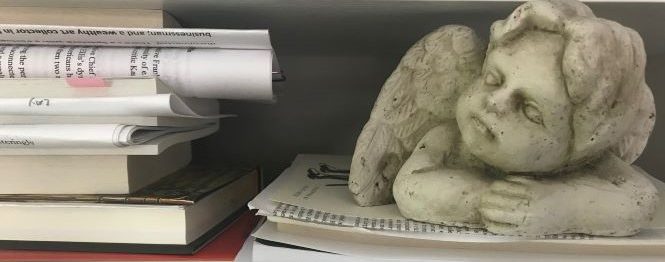I was thrilled to see Europa Editions publish a new novel by Audrey Schulman. I loved her previous novel Theory of Bastards with its memorable protagonist working with bonobos in the field of evolutionary psychology. The plot of her new novel The Dolphin House similarly succeeds in assuming a firm, seductive grip by getting us to deeply care about the lead character and the animals she works with.

I finished the book two nights ago and came away feeling the satisfaction of a fully realized life, having traveled so closely with Cora. She’s the protagonist, a partially deaf girl in her 20s training dolphins to speak English in a research center. She happens upon that center by chance, walking a beach on St. Thomas, where she’s fled after working as a bunny waitress in a Playboy club. It’s the 1960’s. The challenges she faces at the center are animal cruelty and male superiority, which she stands up to using calculated and strategic manipulations. Tension reverberates because of these challenges. I’ll confess that when the dolphins (Bernie, Mother, Kat, and Junior) were in any way put at risk, I reached for my pet corgis, a quick hug. Innocent animals inhumanely treated makes me anxious, but there’s not a lot of that here, more the science of teaching language to dolphins in the seclusion of the research center. The conclusion, maddening and troublesome, perfectly comes together from all that’s transpired. This novel, based on a true story, is another win for Schulman.

This next discovery is quite different, taking as its subject topics of money, power, intimacy, and perception. Joan Silber, one of my favorite authors (Ideas of Heaven, Fools, Secrets of Happiness) writes in her back-of-the-book blurb: “Diaz has once again taken apart an American myth and pondered how we lie to ourselves.” Trust begins with a book published in 1937 about a fabulously wealthy New York couple of the 1920s, a legendary Wall Street tycoon married to the daughter of aristocrats. Rumors and gossip surrounded this couple, providing the mystery for Trust, which unfolds, after the book, in memoirs and documents offering other viewpoints. From the book’s description: “Hernan Diaz’s Trust elegantly puts these competing narratives into conversation with one another — and in tension with the perspective of one woman bent on disentangling fact from fiction.” What attracts me is the exploration of truth in a world of high finance and the 20th century setting (not today’s world of truth, I already have enough of that). “No one document tells the whole story,” Kirkus Reviews writes in its starred forecast, “but the collection of palimpsests makes for a thrilling experience and a testament to the power and danger of the truth—or a version of it—when it’s set down in print.”

Mark Powell has written several novels, but this is the first that’s caught my attention. (That has to do with so many books being published today.) The premise of Lioness is ecoterrorism, about a bomb going off at a water-bottling plant in the mountains of southwest Virginia. Chris Bright, a mountain hermit with a long history of activism, is arrested at the scene. Unaccounted for is Mara Wood, but her estranged husband David cannot quite believe she is dead. As he reconstructs the events of the bombing, he imagines an alternate narrative, part of which includes his wife not having a secret relationship with Chris Bright. This summary I’ve given comes from the book’s description. Add to it the question of what pushes people to act violently, and is that violence ever justified; starred forecasts; mention of it being a page-turner; plus the Appalachian setting; and I’m intrigued. Then there’s this from Kirkus Reviews:
David’s narrative moves backward and forward in time, circling different parts of his marriage to Mara, their respective artistic careers, the birth of their son, and the tragic end to it all. Despite this unconventional structure, Powell’s novel is never confusing; instead, it has a tragic force that propels it toward its destination.

I have Trust on my NetGalley shelf and am hoping to read it next week, although it’s not published in the UK until August. I’d not seen Joan Silber’s puff which makes me even more keen to read it.
LikeLiked by 1 person
I’ll watch for what you think about Trust. I have high hopes for it, eager to read it!
LikeLiked by 1 person